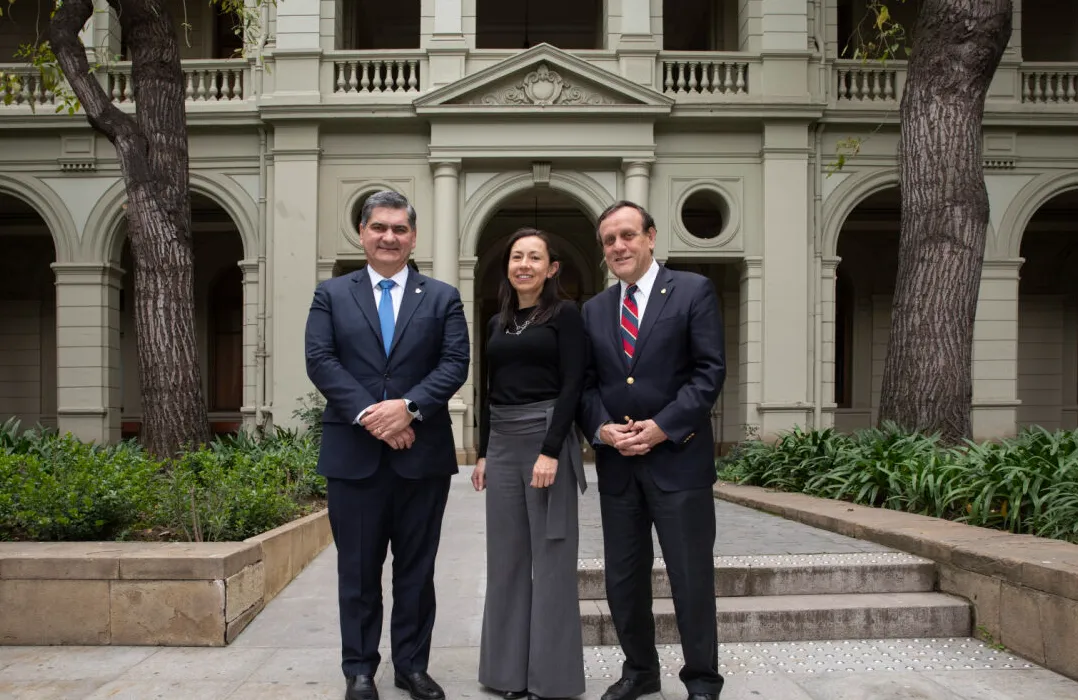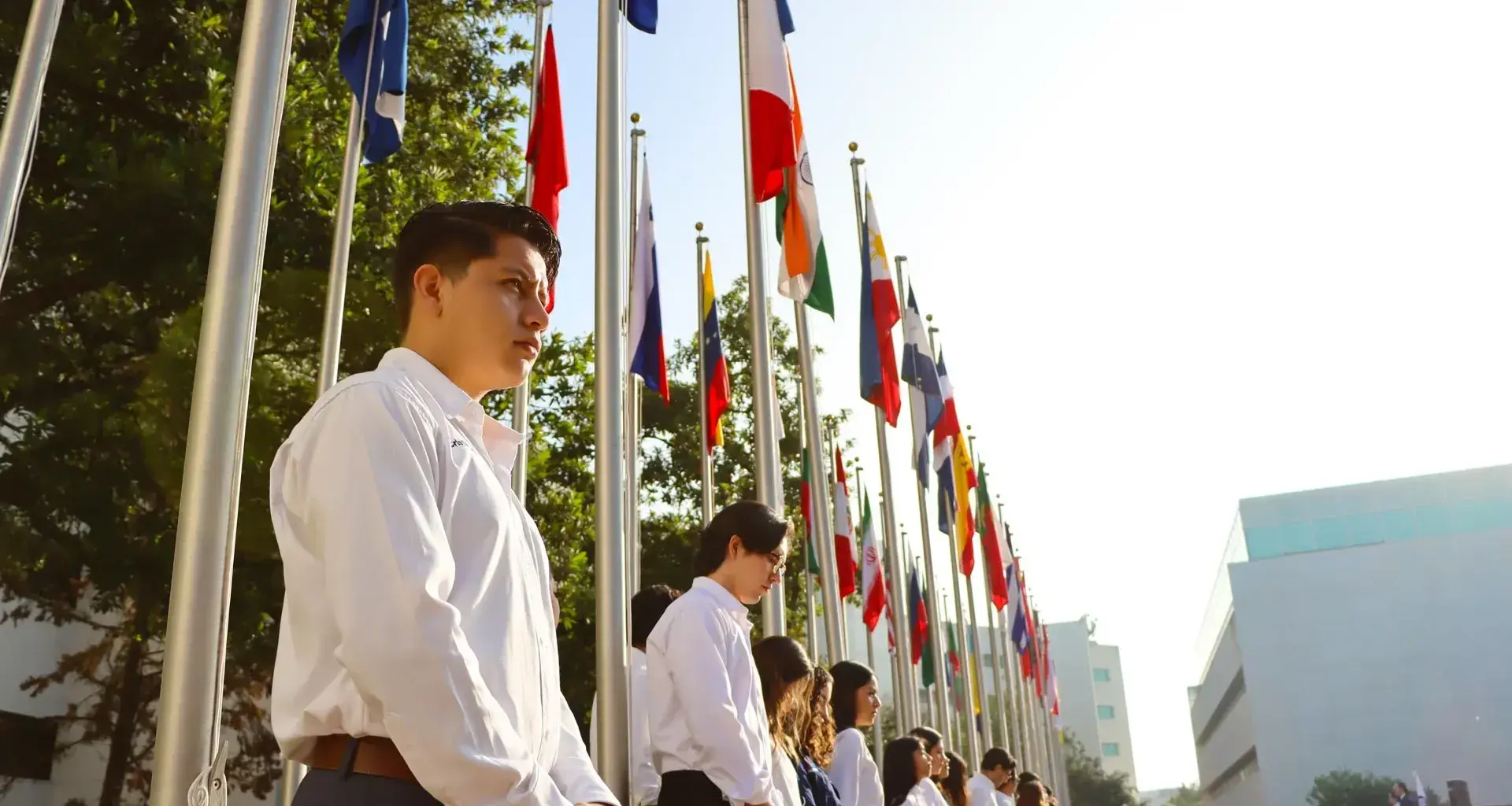Raquel Bernal, David Garza, and Ignacio Sánchez | Opinion | University of Los Andes, Tec de Monterrey, and the Pontifical Catholic University of Chile
Raquel Bernal is Rector of the University of Los Andes; David Garza Salazar, Rector and Executive President of Tecnológico de Monterrey; and Ignacio Sánchez, Rector of the Pontifical Catholic University of Chile.
These three institutions form La Tríada, which is an alliance of the three private universities in Latin America that top the QS rankings. Through this alliance, they collaborate on joint projects.
------
To educate (from the Latin educere) means to guide individuals beyond themselves to lead them to another reality, to a growth oriented towards the fullness of the person. Comprehensive education of excellence allows us to develop as diverse and unique individuals and implies a commitment to our flourishing as human beings, enriched by fundamental values for the ethical and rigorous exercise of democracy. Therefore, education stands as one of the most important assets in any society since it is a vehicle to prepare us for the unknown. Universities, in particular, are called to be those spaces of encounter, articulators between ways of being, doing, and existing, and creators of inclusive, diverse, and resilient societies.
Latin America, with all its contrasts, is an ideal place for experimentation and learning, with the need to reframe education and transform it to make it relevant and pertinent and to strengthen it through research and creation, with dialogue of knowledge and openness to students from all walks of life, of all ages, and from all backgrounds. The current situation presents significant challenges for education globally, especially in higher education. We have identified four main challenges: the fourth industrial revolution, training for citizenship in changing times, growing inequality in multiple dimensions, and changes in the expectations of youth.
ALSO READ:
Campus: National
Tags: La Tríada, education, Latin America, University of Los Andes, Pontifical Catholic University, Tec de Monterrey
Category: Education

El primer reto, la cuarta revolución industrial basada en la inteligencia artificial (IA), genera cambios significativos en la forma en que vivimos, trabajamos y nos relacionamos. La IA nos ofrece grandes oportunidades en múltiples campos de aplicación como salud, energía, cuidado del medioambiente, minería, industria manufacturera, el sistema financiero, el arte y la educación superior, entre muchos otros; y ha conectado al mundo de manera profunda y con implicaciones importantes en las interacciones humanas y la globalización. La IA está transformando la forma en que vivimos y trabajamos, generando la necesidad de adaptación en la educación superior para satisfacer las demandas laborales emergentes.
Las competencias digitales aparecen como una prioridad para que la tecnología sea un potenciador y complemento de la actividad humana. A la vez, debemos responder no solo para adaptarnos a la tecnología, sino para orientar su desarrollo al evitar los sesgos y garantizar su regulación ética con visión humanística. Esto requiere el fortalecimiento de las artes y humanidades, y de las ciencias sociales.
El segundo reto tiene que ver con el compromiso de las universidades en la formación de personas y ciudadanos ejemplares de sus sociedades. Al igual que los sectores económicos, las sociedades, las democracias y los contextos personales en los que convivimos han cambiado. La formación ciudadana se vuelve crucial en un mundo marcado por crisis climáticas, avances tecnológicos y conflictos globales.
En tercer lugar, y especialmente en Latinoamérica, enfrentamos grandes desafíos asociados a la creciente desigualdad de ingresos en nuestros países, situación que se intensificó a raíz de la pandemia y que con la actual revolución podría exacerbarse. Los países del norte y las ciudades cuentan con mayores y mejores recursos para que sus habitantes puedan acceder, familiarizarse con la tecnología y sacar el mayor provecho de ella. Si en nuestra región fallamos en atender esta formación, se podría intensificar la diferenciación en el acceso y la generación del conocimiento.
La educación superior debe aspirar a sociedades equitativas y justas, pero enfrenta una crisis de legitimidad debido a la exclusión y la falta de acceso a certificaciones educativas. Crisis que se agrava en muchos países de Latinoamérica porque el acceso a la educación superior sigue siendo para minorías, y porque muchas personas que ingresan a la universidad la abandonan sin un diploma o una certificación. Esto erosiona la percepción del valor de la educación superior.
Finalmente, las expectativas de las nuevas generaciones son distintas a las de quienes en estos momentos estamos a cargo de su formación. Ellas valoran más la experiencia que el resultado, quieren tener proyectos de vida de alto impacto, no están interesadas en carreras laborales largas o estables. Por la exposición temprana a los dispositivos digitales y a las redes, son personas acostumbradas a la inmediatez y, a la vez, con altísimos niveles de exigencia. Esto tiene implicaciones en la manera como aprenden y las razones por las cuales quieren (o no) adquirir un grado en educación superior.
The first challenge, the fourth industrial revolution based on artificial intelligence (AI), generates significant changes in the way we live, work, and interact. AI offers us great opportunities in multiple application fields such as healthcare, energy, environmental care, mining, manufacturing, the financial system, art, higher education, and many others. It has connected the world in profound ways with important implications for human interactions and globalization. AI is transforming the way we live and work, generating the need for adaptation in higher education to meet emerging labor demands.
Digital skills have emerged as a priority for technology to be an enhancer and a complement to human activity. At the same time, we need to respond not only to adapt to technology but also to guide its development by avoiding biases and ensuring its ethical regulation with a humanistic vision. This requires strengthening the arts and humanities and the social sciences.
The second challenge has to do with the commitment of universities in the formation of outstanding individuals and citizens of their societies. As economic sectors, societies, democracies, and the personal contexts we live in have changed, citizenship education becomes crucial in a world marked by climate crisis, technological advances, and global conflicts.
Thirdly, and especially in Latin America, we face major challenges associated with the growing income inequality in our countries, a situation that intensified in the wake of the pandemic and could be exacerbated by the current revolution. Countries and cities in the Global North have more and better resources for their inhabitants to access, familiarize themselves with, and take full advantage of technology. If we fail to attend to this training in our region, it could intensify the differentiation in access to and generation of knowledge.
Higher education should aspire to form equitable and just societies, but it faces a crisis of legitimacy due to exclusion and a lack of access to educational certifications. This crisis is aggravated in many Latin American countries because higher education continues to be accessible to a minority of people and because many people who enter university leave without a diploma or certification, thus eroding the perceived value of higher education.
Finally, the expectations of the newer generations are different from the expectations of those of us who are currently in charge of their training. They value experience more than results, they want to have high-impact life projects, and they are not interested in long or stable careers. Due to early exposure to digital devices and networks, these people are accustomed to immediacy, while also having very stringent demands. This has implications for the way they learn and the reasons why they want (or don’t want) to acquire a degree in higher education.
Universities are called upon to respond to these challenges and to deepen our contribution. Today, more than ever, we need to strengthen the development of transversal competencies that enable people to navigate a changing and uncertain world in an ethical manner and with a genuine desire to contribute to the common good. Communication, self-directed learning, creativity, critical thinking, collaboration, adaptability, and change management are some of the skills that universities should strengthen in people to face uncertainty, which will allow them to advance in diverse life projects, have greater mobility between occupations and sectors, and contribute to the construction of just, inclusive, and sustainable societies.
We have the responsibility to transform ourselves in the face of these changes through the creation of new knowledge and through our role as trainers of people throughout their lives. Educational innovation must respond not only to the availability of new technology but mainly to the fact that our students need to be trained with new superior skills. This will imply permanent revisions in undergraduate and graduate programs, transforming classrooms into active learning spaces with new management platforms and more flexible integration, implementing significant changes in evaluation methodologies, and taking into consideration the diversity of the student body by leveraging technology.
We need to support the projects of everyone beyond just the period between 17 and 25 years of age. We need to acquire, expand, and update skills throughout life not only to strengthen job profiles that will be permanently changing but also to support personal life projects and strengthen commitment to shared social projects.
In addition to offering post-secondary education, in which students will be able to design their professional future, higher education should provide this type of education with flexible, cumulative, and inclusive trajectories. A flexible pathway can be acquired at any time and place, a cumulative pathway allows for the addition of skills obtained through different types of educational offerings, and an inclusive pathway takes into account the characteristics of the student.
Collaboration between governments, the private sector, and the education sector is essential to increasing access to quality education globally, ensuring more and better opportunities for people to transform their lives, while impacting economic growth, global development, and equity. This implies equitable access at all educational levels by removing existing barriers for many population groups, promoting diversity of experiences, and providing different perspectives in universities.
Inter- and multiculturalism have become fundamental elements for learning and making an impact on societies. Diversity enhances people’s ability to solve local and global problems and increases creativity and innovation. Educating for global citizenship also means training in the knowledge of the place where we are: the global begins at home. We believe that to achieve this it is essential to prioritize early education, flexible educational paths, and technological integration as pillars for closing learning gaps and promoting fairer and more sustainable societies.
Universities need to continue to play an active role in training, research, and creation that will enable us to contribute to solutions to the great challenges facing humanity. The climate crisis, the protection of biodiversity, geopolitical conflicts, the fragility of democracy, and other issues require a much greater interdisciplinary effort than we have made so far. In this new transformed model of higher education, universities need to be centers of debate and solutions for local and major global problems, catalysts of technology, and generators of research and creation with high social impact.
In Latin America, we can connect with the common experiences of the Global South, which transcend geographical borders and represent shared dynamics. We have the experience and capacity to understand and produce knowledge about these realities typically considered to have been overcome by the economic, political, and social development of the West.
We need to work in alliance with other universities and interact with various new stakeholders in the educational ecosystem by connecting with economic sectors, governments, and civil society. By building partnerships, we can fulfill our promise to promote the flourishing of people and contribute to societies that are just, equitable, sustainable, and respectful of diversity. Latin America requires universities like ours to face these challenges effectively.
ALSO READ:





